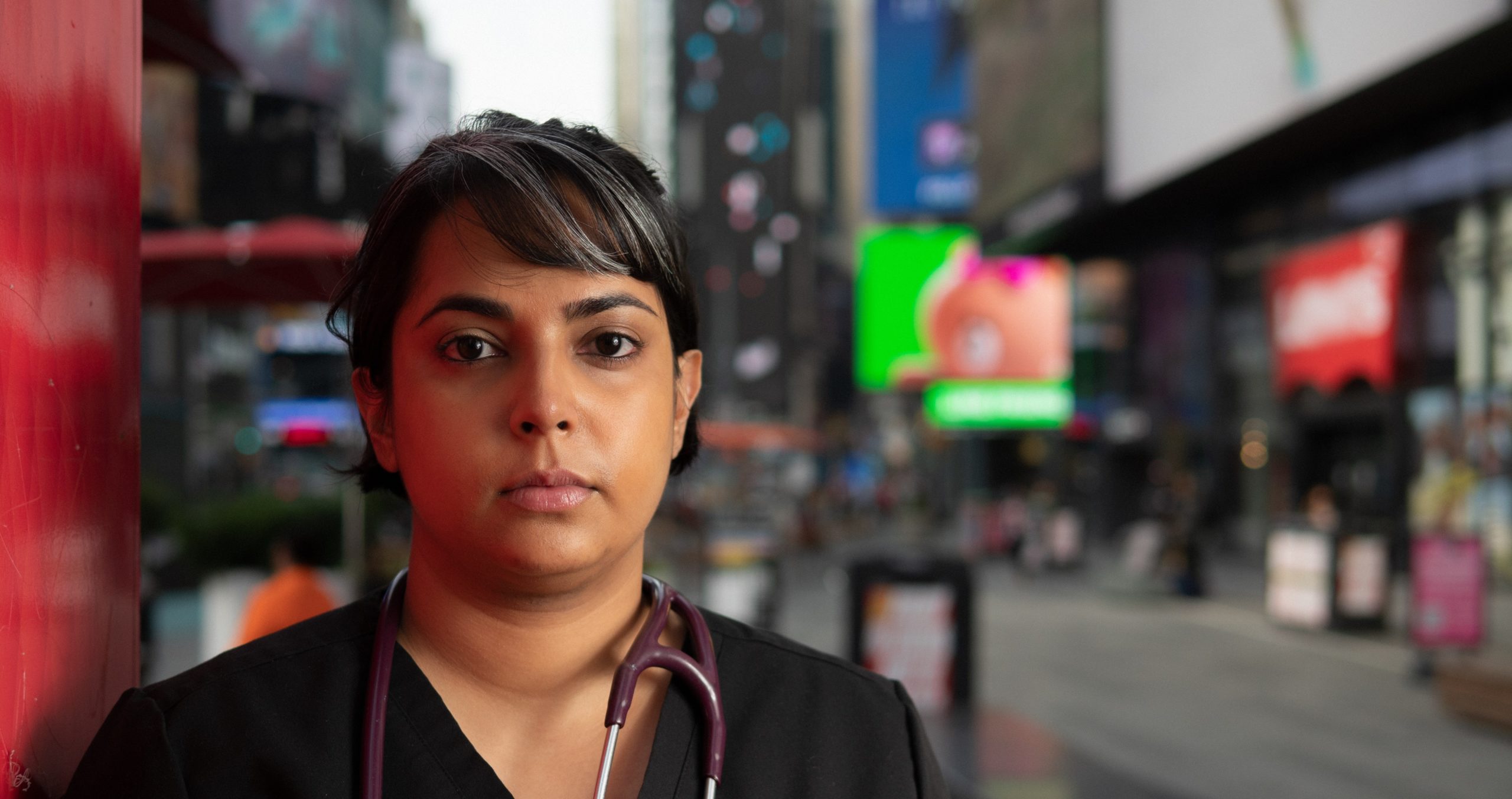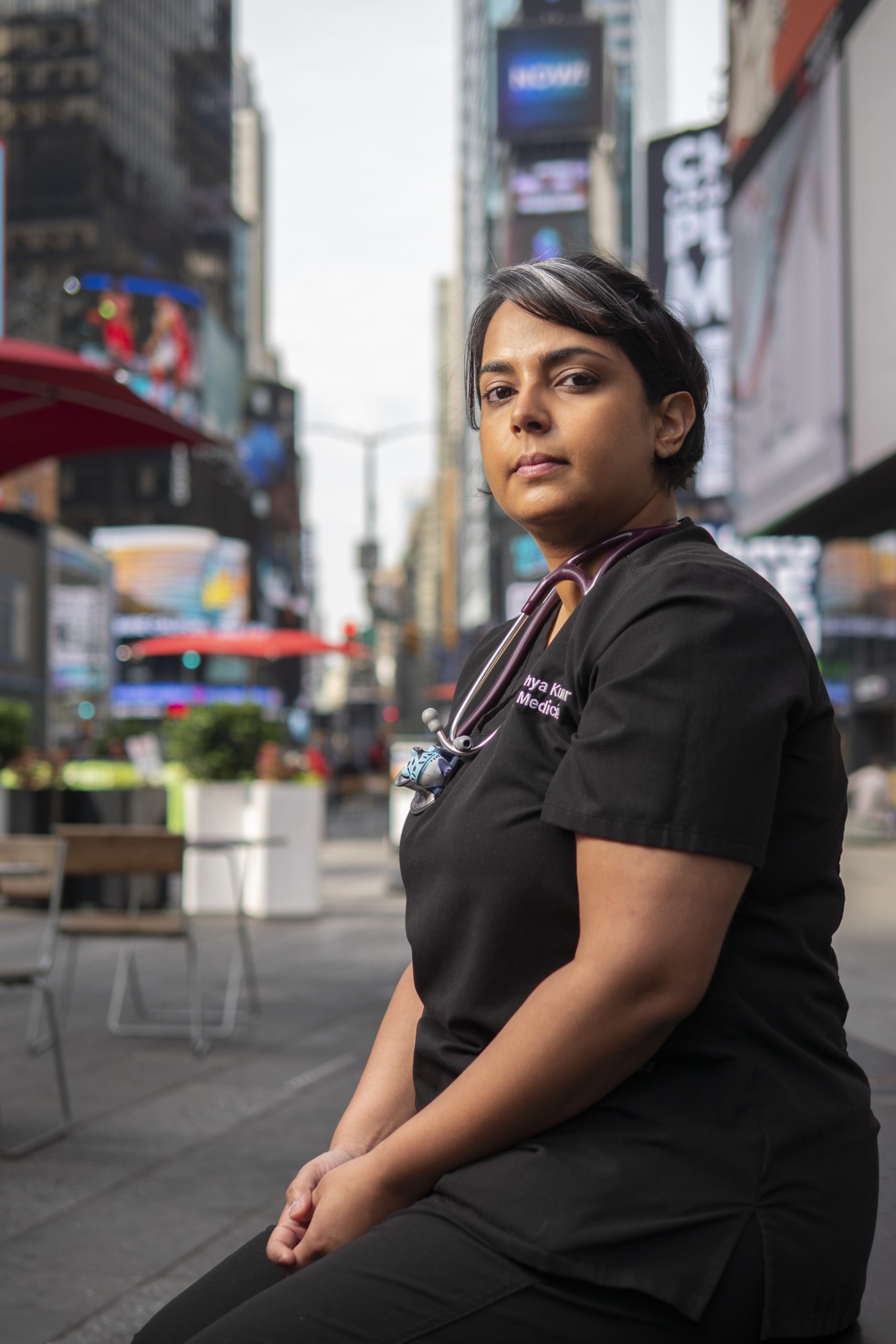
In 2018, Helmsley launched the Collaborative for Homeless Healthcare, a program that brings together some of the largest players in homeless healthcare in New York City with the goal of improving access to and quality of healthcare for New Yorkers without homes. From its earliest days, the Collaborative sought to address the persistent recruitment challenges that made it hard for clinics to hire doctors with the skills and commitment to provide homeless healthcare – a notoriously difficult field. The Collaborative envisioned launching a fellowship to give doctors the training and career guidance they need, building off of a model that has worked in other medical specialties. Together with Montefiore Medical Center, which has extensive experience in community and homeless medicine, the Collaborative launched the New York City Homeless Healthcare Fellowship in July 2020.
We sat down with Dr. Sandhya Kumar, MD MPH, director of the fellowship, to discuss how the program came to be, her goals, and the partnership between the Montefiore Medical Center and Helmsley. The interview has been edited for clarity and length.
Dr. Kumar: I grew up in Alabama, and I would spend my summers going to India, which is where my family is from. When I was there, I saw disparities between how I grew up and what I witnessed on the streets in India and it was heartbreaking.
I originally thought that I would practice medicine outside of the U.S. and go to places that have similar settings to what I witnessed when I was young, but I found as my worldview broadened that there was devastating poverty and disparities within our communities in the U.S. This shifted my interest to providing care in urban underserved areas, similar to Birmingham, Alabama, where I went to medical school and the Bronx, New York, where I trained to practice family and preventive medicine. 
The number of people staying in shelters in our city has remained over 45,000 for the past several years, with thousands more people living unsheltered in places such as parks, on the street, or in the subway system. Homelessness is well-known for its association with poor health. We know that when people are experiencing homelessness, it becomes harder to control chronic conditions such diabetes, high blood pressure, and mental illnesses. In addition, people who are experiencing homelessness are also at higher risk for developing new conditions, and various factors such as lack of insurance, lack of transportation, history of trauma, and more can make it difficult for patients to engage meaningfully with the traditional healthcare system.
There are programs that tailor their care for people experiencing homelessness with the aim of reducing as many barriers to care as possible by bringing healthcare to patients through shelter-based clinics, mobile units, and street medicine. These programs are effective and well-received. Homeless healthcare often requires physicians to think creatively about how to safely adapt our usual approaches to medicine in order to offer and provide care that is acceptable to the patient and realistically feasible, and to do so in a way that is trauma-informed and patient-centered. Providers in this field are at high risk for burnout as they provide care to meet complex patient care needs in non-traditional and under-resourced settings and often experience vicarious trauma from hearing about the trauma their patients have experienced. We have heard that it can be challenging for homeless healthcare organizations to recruit, train, and retain homeless healthcare providers in the field.
We launched the New York City Homeless Healthcare Fellowship specifically for early career physicians to help bridge the gap in knowledge and skills needed to be effective in providing care in non-traditional settings and to retain these physicians in the workforce by fostering resiliency and building skills to combat burnout and vicarious trauma.
As homeless healthcare providers, we are often the first point of contact with the medical system for many of our patients experiencing homelessness, and for some, we are the only point of contact. We have focused our training on addressing the broad needs of our specific patient population and our program aims to prepare fellows with a strong set of skills to meet healthcare needs that are more common among the patients we serve. Our fellow this year is using her growing skillset to provide care at Project Renewal three days a week, with two of those days at a shelter-based clinic and one day on a mobile unit. She spends the other two days of the week in educational activities, with half a day in lectures, half a day working on a scholarly activity, and the last day in experiential learning. This day spent in experiential learning allows the fellow to visit community organizations to understand how they function and what resources they offer. One of the most important pieces of experiential learning is being able to understand what kind of experiences our patients may have had before they enter our clinic and what resources are available to help support them.
I am constantly inspired by our patients. I have a patient who is a 22-year-old woman, with two school aged children, and she has a lengthy medical history, including blood clots in her lungs, dangerous thyroid dysfunction, seizure disorder, and traumatic brain injury. She has endured domestic violence since she was 14 years old and has had to move around to different boroughs for safety. She cannot read or write and is still impressively navigating a very complex system, mostly on her own, carrying with her an enormous medical file with her to different specialty appointments. She’s known to hospitals across boroughs, but regardless of whichever borough she’s currently sheltered in, she always returns to our clinic for primary care. We know her story, we are her medical home, and she knows that she is truly seen when she is at our clinic.
COVID-19 has challenged us to think creatively about how we can and will meet the unique needs of our patients. In New York City, our patients who were in congregate shelters have moved to hotels, which has been valuable as a public health measure to reduce the risk of coronavirus infection and transmission. But this also means our patients are often in new neighborhoods or different boroughs with different resources available to them. In homeless healthcare, we have had to think about how we can continue to provide primary care and mental healthcare services, while also prioritizing patient safety. Telehealth has been widely used and is valuable in reaching our patients and keeping them engaged in primary care and mental healthcare. In general, as we move forward, it is critical for us to dissect, how we got here: the ways that structural inequities along racial and economic lines have predisposed our patients to be disproportionately affected by these two crises, homelessness and COVID-19.
I think every homeless healthcare provider hopes that one day soon, we’ll be out of a job. Unfortunately, due to the scope of economic devastation from COVID-19, we worry that it will be even harder for our patients to exit homelessness. One of my patients shared recently that he was on a steady path to move from shelter to housing when he lost his job as a sanitation worker during the pandemic, which was an important income source for him to be able to live independently. Since then, he has been unable to find a job and feels very discouraged about the immediate future. His story is so common.
In this year, I’m very hopeful that our community leaders will support interventions that help to prevent homelessness and help those who are living in homelessness return to stable housing. Now more than ever, it’s important for our health care providers to work closely with mental health providers and social service providers to acknowledge the trauma of homelessness. We must address the social determinants of health, which requires both an understanding of the experiences that patients may have had before they enter the clinic, as well as the ability to connect people to resources that are available in the community to support our patients. I am hopeful that we as a community invest in those resources that boost access to affordable housing, healthy food, and safe environments, which we know promote better health outcomes.
. . .
The Homeless Healthcare Fellowship will welcome its second year-long cohort in summer 2021 for three new fellows, with funding from Helmsley’s Collaborative for Homeless Healthcare.